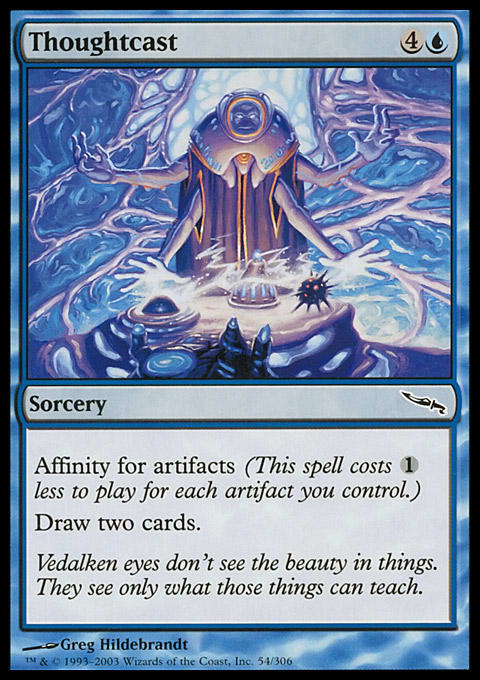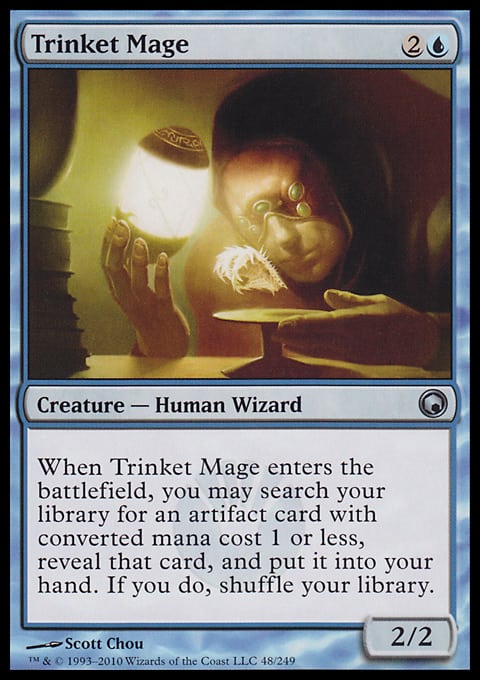Pauper is not an isolated island of Magic. While the format does eschew uncommons, rares, and mythic rares, the same fundamental rules of the game apply. It is this truism that represents one potential starting point for when I try to build new decks. Today, with more content than ever before, it is far easier to find inspiration that the past.
I was watching some Vintage Super League, and I saw Luis Scott-Vargas pilot a deck with Thoughtcast in the main. Now, Vintage is a format in which Ancestral Recall is legal (sure, it’s restricted, but work with me here). If one of the game’s very best players considered Thoughtcast to be strong enough for that format, it surely could do good work in Pauper outside of Affinity.
Affinity ? Pauper | DaveLombardoJr, 5?0, Pauper League, April 5
- Creatures (16)
- 4 Atog
- 4 Carapace Forger
- 4 Frogmite
- 4 Myr Enforcer
- Spells (27)
- 2 Fling
- 2 Perilous Research
- 4 Galvanic Blast
- 4 Thoughtcast
- 2 Chromatic Sphere
- 2 Lotus Petal
- 3 Prophetic Prism
- 4 Chromatic Star
- 4 Ichor Wellspring
- Lands (17)
- 1 Vault of Whispers
- 4 Ancient Den
- 4 Great Furnace
- 4 Seat of the Synod
- 4 Tree of Tales
- Sideboard (15)
- 3 Ancient Grudge
- 2 Dispel
- 2 Feed the Clan
- 2 Journey to Nowhere
- 2 Krark-Clan Shaman
- 2 Relic of Progenitus
- 2 Scattershot Archer
Thoughtcast Control ? Vintage | Luis-Scott Vargas, Vintage Super League
- Creatures (1)
- 1 Blightsteel Colossus
- Planeswalkers (3)
- 1 Jace, the Mind Sculptor
- 2 Dack Fayden
- Spells (43)
- 1 Ancestral Recall
- 1 Brainstorm
- 1 Dig Through Time
- 1 Misdirection
- 1 Thirst for Knowledge
- 2 Flusterstorm
- 2 Repeal
- 3 Mental Misstep
- 4 Force of Will
- 1 Demonic Tutor
- 1 Time Walk
- 1 Tinker
- 1 Treasure Cruise
- 1 Yawgmoth's Will
- 2 Preordain
- 4 Thoughtcast
- 1 Black Lotus
- 1 Lotus Petal
- 1 Mana Crypt
- 1 Mana Vault
- 1 Mox Emerald
- 1 Mox Jet
- 1 Mox Pearl
- 1 Mox Ruby
- 1 Mox Sapphire
- 1 Sensei's Divining Top
- 1 Sol Ring
- 1 Time Vault
- 2 Voltaic Key
- 2 Mox Opal
- Lands (13)
- 2 Underground Sea
- 2 Volcanic Island
- 4 Scalding Tarn
- 1 Tolarian Academy
- 4 Seat of the Synod
- Sideboard (15)
- 1 Mental Misstep
- 1 Red Elemental Blast
- 1 Duress
- 2 Grafdigger's Cage
- 4 Ingot Chewer
- 2 Ravenous Trap
- 2 Viashino Heretic
- 1 Mountain
- 1 Simian Spirit Guide
Affinity is the best Thoughtcast deck in Pauper—that is not in question. The deck runs an exclusively artifact-land mana base that can fully exploit its eponymous mechanic. People familiar with Pauper know it does not matter how quickly Affinity empties its hand because the opportunity to draw new threats exists for only a single blue mana. Here, the draw spell may be at its best, as Affinity can spend the early turns establishing threats and softening a life total. Having Thoughtcast and open mana makes it far easier for Affinity to follow up attacks with copies of Galvanic Blast and Fling for Atog.
The cost is where Thoughtcast shines. The mana constraints of Pauper can often make it hard to follow up a draw spell with relevant plays. Mulldrifter is probably the best way to gain card advantage in the format, and the deck that can best make use of the flying fish is Tron, which can only do so due to its overabundance of mana. Without Tron, Mulldrifter is an isolated play that can tap out the caster of all resources.
Mulldrifter might be the best way to accrue card quantity in Pauper, but Mystical Teachings is the best way to increase card quality. Teachings decks can ignore the restriction of casting spells on their own turns. Instead, such a deck can use its namesake to fetch an additional copy of Teachings or a counterspell or to find Accumulated Knowledge to refill a grip. Unlike Tron, Teachings builds will operate almost exclusively at instant speed, so they can place less emphasis on the amount of mana they need to invest on their own turns.
In both instances, however, there is a temporal cost to drawing cards. Tron takes time to set up, and even with the full suite of lands in play, the deck requires access to discrete colors of mana via Prophetic Prism. Mystical Teachings is not a cheap spell either, and it can often find its controller at an extremely low life total before it can turn into a card-advantage machine. Thoughtcast does not completely solve this problem, but it does offer a potential solution. But just as with math in grammar school, we’re going to have to show our work.
Thoughtcast makes demands in deck construction, and that is the inclusion of artifacts. In turn, any successful Thoughtcast deck will need to include as many artifact lands as possible. Having a mana base that is partially mechanical makes it so that, when casting the key spell, each land produces an additional mana. Thoughtcast also asks that spells are biased toward artifacts. In some instances, this will mean an Executioner's Capsule over a Doom Blade or a Porcelain Legionnaire over a Kor Skyfisher. In slower builds, running copies of the Ravnica-block Signets allows for increased mana development while also reducing the cost of drawing cards.
Thoughtcast also can bias a deck toward cards that reward running artifacts. Galvanic Blast is among the very best reasons to attempt metalcraft, as it can handle almost every threat in the format. Trinket Mage turns into the very best Borderland Ranger, as it can not only go find a land, but also potential silver bullets like Relic of Progenitus, Viridian Longbow, or the aforementioned Executioner's Capsule. Sanctum Gargoyle and Remember the Fallen can become enticing options to help supplement a long game as well.
Regarding nonartifact-aligned spells, Thoughtcast can push decks toward cheap, sorcery-speed removal. Looking to Sign in Blood—a far more played sorcery-speed draw-two—we see Mono-Black Control running an abundance of sorcery-speed spells including Chainer's Edict and Oubliette. Thoughtcast does not require the same devotion to a specific color of mana, so any deck featuring the spell can branch out for board control. Journey to Nowhere and Flame Slash jump to mind, but so does Innocent Blood. The ability to cast a Thoughtcast for a single mana on turn four and then deploy a threat or affect the battlefield is a massive swing in Pauper. The question is, then, Why has this not caught on?
Again, we have to look to Affinity. The presence of the deck in the metagame has forced sideboards to account for its existence. Copies of Ancient Grudge and Kor Sanctifiers are everywhere as a way to help contain the machine menace. The real culprit is Gorilla Shaman. An early Gorilla Shaman can spell Armageddon for Affinity, as it eats lands for a single mana. Coming down on turn two to guarantee the Mox Monkey gets its due, an unanswered Shaman can completely dominate the matchup.
Affinity is so powerful that it is worth the risk to run the deck in the face of Gorilla Shaman. Until now, I would not say the same thing about non-Affinity Thoughtcast decks. What changed? Thraben Inspector.
Thraben Inspector advances a board state by two permanents while also adding an artifact to the battlefield. A turn-one Ancient Den for the Shadows over Innistrad standout means that a turn-two Seat of the Synod turns on Thoughtcast with another card coming down the line. Expose Evil and Press for Answers let these decks stay alive while also increasing the artifact count. These two spells also play very nicely with another 1-drop that has new life thanks to Clues: Vedalken Certarch.
Azorius Metalcraft ? Pauper | 420dragon, 5?0, Pauper League, April 16
- Creatures (25)
- 1 Kor Sanctifiers
- 4 Ardent Recruit
- 4 Auriok Sunchaser
- 4 Glint Hawk
- 4 Kor Skyfisher
- 4 Mulldrifter
- 4 Vedalken Certarch
- Spells (12)
- 4 Journey to Nowhere
- 4 Ichor Wellspring
- 4 Prophetic Prism
- Lands (23)
- 2 Island
- 3 Plains
- 1 Lonely Sandbar
- 2 Tranquil Cove
- 3 Secluded Steppe
- 4 Azorius Chancery
- 4 Ancient Den
- 4 Seat of the Synod
- Sideboard (15)
- 3 Dispel
- 1 Divine Offering
- 2 Hydroblast
- 1 Last Breath
- 2 Lone Missionary
- 2 Negate
- 2 Rest for the Weary
- 2 Sunlance
Vedalken Certarch is a powerful card. In a format where Gurmag Angler and Delver of Secrets excel at ending games, the ability to tap them down repeatedly is huge. Certarch goes a step further and does a full Icy Manipulator impression in its ability to keep lands under its four thumbs. Combined with the investigate spells that can keep creatures tapped, Certarch represents another way to press a tempo advantage.
To me, that tempo advantage is the reason to run this strategy. Ardent Recruit and Auriok Sunchaser are both above the curve when fully active. Kor Skyfisher and Glint Hawk are strong cards but run contrary to the idea of continuously advancing a board state. Court Homunculus may be a better turn-one play when trying to attack. Removing Skyfisher and Hawk also obsoletes the need for Prophetic Prism and Ichor Wellspring and allows the deck to run cards that can impact the board while also turning on metalcraft. Updating the deck with these ideas give us something like this as a starting point:
Updated Metalcraft ? Pauper | Alex Ullman
- Creatures (24)
- 4 Ardent Recruit
- 4 Auriok Sunchaser
- 4 Thraben Inspector
- 4 Trinket Mage
- 4 Vedalken Certarch
- 4 Court Homunculus
- Spells (15)
- 2 Press for Answers
- 2 Sunlance
- 4 Thoughtcast
- 3 Journey to Nowhere
- 1 Bonesplitter
- 1 Flayer Husk
- 2 Aether Spellbomb
- Lands (21)
- 4 Island
- 5 Plains
- 4 Tranquil Cove
- 4 Ancient Den
- 4 Seat of the Synod
In a deck with such a low curve, twenty-one lands may be too many, but hitting enough to resolve Thoughtcast is crucial. Trinket Mage gives the deck access to a small tool box that has the opportunity to be expanded in the sideboard with Viridian Longbow, Relic of Progenitus, Bonded Construct, and Origin Spellbomb.
Thoughtcast is a powerful card, and the advent of Clue tokens begs for investigating other options for the card. With new artifacts and ways to keep cards flowing, it may be enough to warrant the risk of running into Gorilla Shaman. Eldritch Moon may provide other opportunities to add artifacts to the battlefield, and I can’t wait to try to solve that puzzle.



























